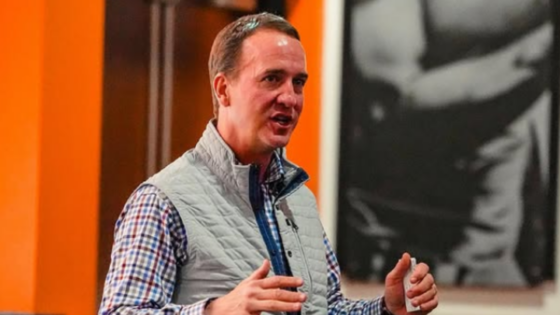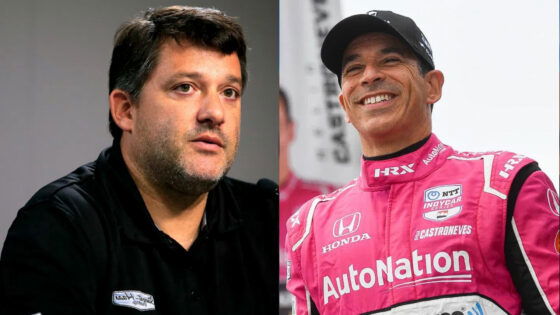“I’m trying to enjoy it and just want him to enjoy it. If he’s happy, I’m happy; if he’s distraught, I’m probably a little bit that way too.” Cooper Manning watched as his son Arch completed 12 of 19 passes for 138 yards in his Texas debut last September. The stat line was solid, but Cooper saw beyond the numbers – the poised footwork, the quick reads, the weight of a legacy Arch now carried. Cooper saw what few could – the ghost of his own derailed career in every throw.
That’s why Peyton Manning‘s Wednesday, July 30, sit-down with Chris Collinsworth took an unexpected turn. While the public often focuses on the Manning football dynasty – from Peyton and Eli, and now Arch’s rising career – Peyton steered the talk toward someone far less famous but equally important: his brother Cooper. Football fans know the Manning name because of Peyton’s laser-sharp passes and Eli’s clutch Super Bowl wins. But years before either brother became a legend, there was Cooper – the oldest Manning son, the one who was supposed to make it first.
At 6’3” with glue-like hands and the fearlessness to streak across the middle of the field, Cooper wasn’t just good. He was special. “I completed 120 passes that year. I threw 90 of them to my brother… He was kind of a Chris Collinsworth. I mean, he was 6’3″, he could run great routes, fearless across the middle,” Peyton told Chris. An Ole Miss scholarship waited for him. The NFL draft chatter would’ve come next. However, in his freshman year, Cooper experienced numbness in his hands. Doctors delivered the gut punch: spinal stenosis, a narrowing of the spine that made every hit a risk. Just like that, his career was over.
Most athletes would’ve raged at the injustice. Not Cooper. “When they took football away from me, I never took it out on the game,” he later told USA Today. “I really never had any bitterness. I just said, this is the hand I’m dealt.” Instead of wallowing, he did something extraordinary—he wrote Peyton a letter. Not a “poor me” note, but a promise: “I’m going to live my dream of playing football through you.” Those nine words became Peyton’s fuel. Every pass he threw, every record he broke, he carried Cooper with him.
“So every day that I played, I never took it for granted,” Peyton told Collinsworth. “Because it could be over in any minute.” Cooper never got his highlight reel. But he built something lasting – a family, a business career, and a legacy as the Manning who taught them all how to lose with grace and win without ego.
The redemption of Cooper Manning
Football never truly left Cooper Manning – it just reshaped itself around him. For ten seasons, he’s dissected plays on Fox NFL Kickoff’s The Manning Hour, his dry wit and receiver’s instincts cutting through analyst cliches. Off-camera, he thrives as a senior managing director at AJ Capital Partners, a role far from stadium lights but no less competitive. Yet every June, he returns to the grass, coaching at the Manning Passing Academy alongside Archie, Peyton, and Eli. A reunion where his critiques carry the weight of unfinished potential.
His unseen imprint on the game runs deeper. Before Peyton’s 18 became iconic in Indianapolis, it was a silent pact – a number chosen to honor the brother whose own jersey never saw an NFL field. Now, history pivots to Cooper’s son, Arch, who wears No. 16 at Texas, threading the family’s football DNA into a new era. The symmetry is stark: where Cooper’s career halted at Ole Miss, Arch’s accelerates toward the same campus Peyton once dominated at Tennessee.
Image Credits: @coopermanning
The 2026 NFL Draft looms as Arch’s likely coronation, a moment that would rewrite the Manning narrative. For Cooper, it’s neither vindication nor consolation, but something rarer – a legacy that outran genetics. His hands won’t cradle a Lombardi Trophy, but his son’s might. His name won’t fill a stat sheet, but his insights shape broadcasts, his mentorship molds recruits, and his resilience echoes in Peyton’s Hall of Fame speech.
Fans count greatness in seasons played and trophies won. Cooper Manning built his after football said no, not with highlight reels, but through quiet influence. Now, that same game may give him something unexpected: a draft night call for his son, finally connecting what was taken from him to what’s still to come.
The post Cooper Manning’s Private Letter to Peyton Manning Resurfaces With a Heartbreaking Truth appeared first on EssentiallySports.



